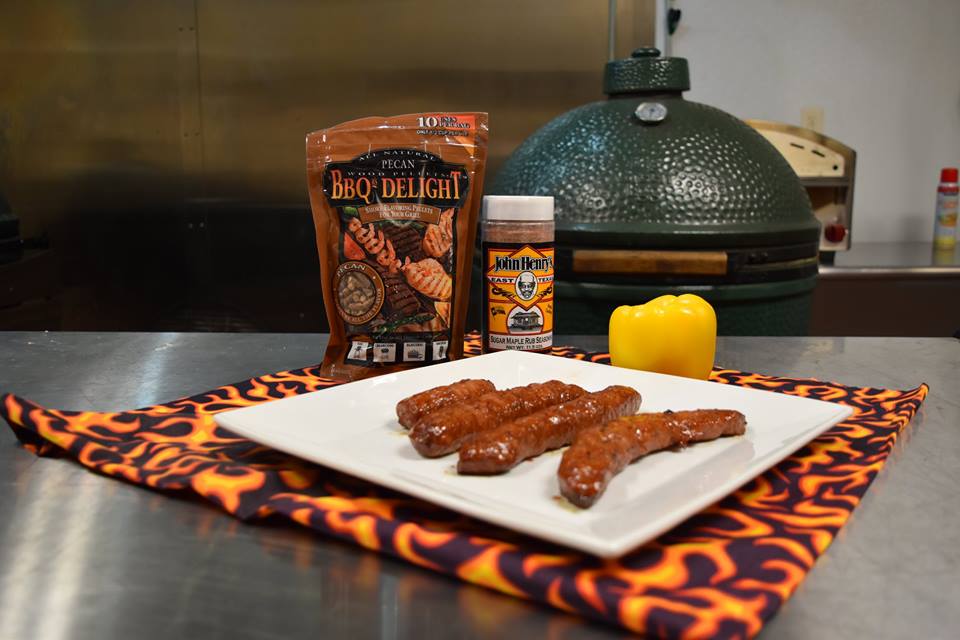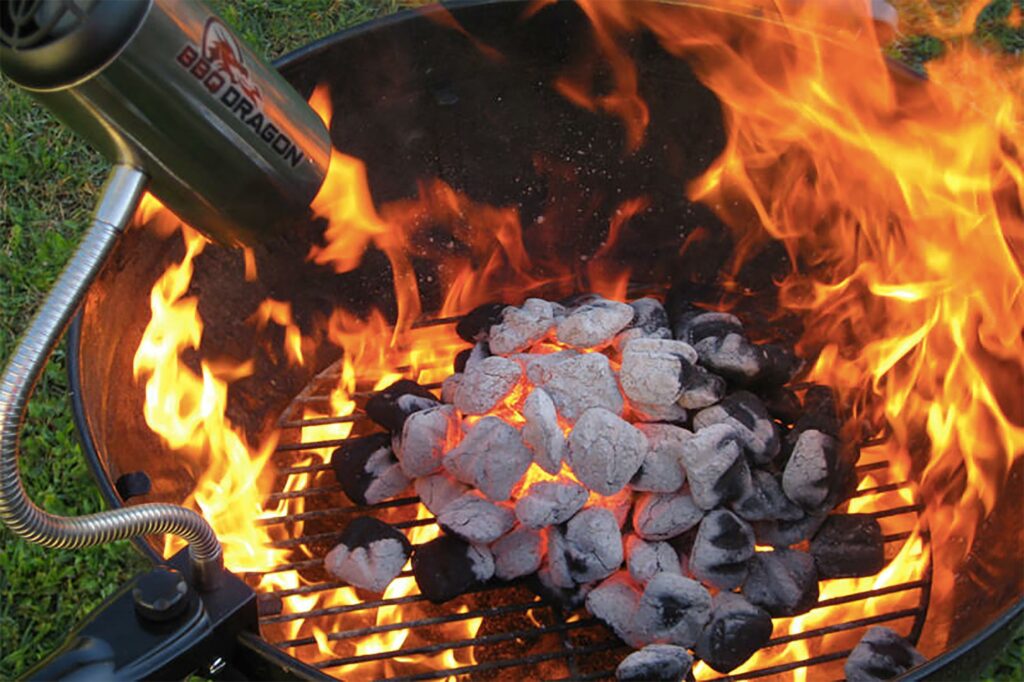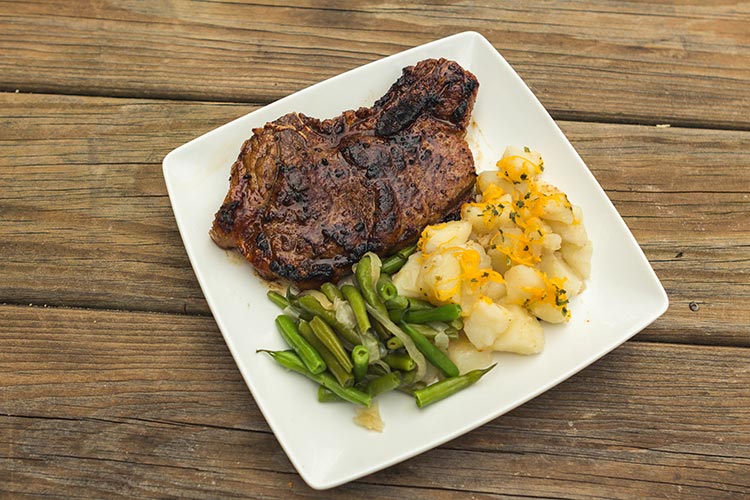Barbecue enthusiasts frequently ask us about cooking times and temperatures for certain meats, so we’ve compiled a bunch of the common cuts in a handy chart for your reference.
Remember that time is only an estimate and the internal temperature of the meat is what determines when it’s done. Trying to rush meat causes stress and eating under-cooked food can make you sick. On the longer cooks, you should either allow for a flexible meal time or give it extra time and plan on holding the meat until serving time.
Suggested Article: How to Finish Your Meat on Time—While Sipping Your Favorite Beverage
An instant-read thermometer is a worthwhile investment for any barbecue enthusiast. Whether you have $30 to spend on a thermometer, or you decide to go with a higher-end one such as the Thermapen MK4, learn how to use it, and you’ll be well on your way to serving world-class barbecue to your guests with confidence!
Browse some of our high quality thermometers here. Call us at (717) 355-0779 or visit us at 140 W Main Street in New Holland for prices and to check our current selection.
Click the food names in blue for cooking instructions.
Temperatures are listed in Fahrenheit.
Meat | Method | Finish Temp | Cooking Temp | Estimated Time |
|---|---|---|---|---|
Indirect | 180–185 (thigh) | 250–275 | 30 minutes per pound | |
Whole Trout | Direct | Opaque and flaky | Low | 6–7 minutes per side |
Indirect | na | 225–250 | 2–3 hours | |
Whole Chicken | Indirect | 180–185 (thigh) | 250–275 | 3–5 hours |
Turkey Breast (bone-in) | Indirect | 165 | 250–275 | 3–4 hours |
Indirect | 130–135 (medium rare) | 225–250 | 2 hours | |
Tilapia | Direct | Flaky | Medium-high | 4 minutes per side |
Indirect | 190–205 | 225–250 | 5–6 hours | |
Direct | Opaque and pink | 350–450 | 5–7 minutes | |
Scallops | Direct | 130–140 (opaque) | Medium-high | 2–3 minutes per side |
Salmon (slow) | Indirect | 130–140 (flaky) | 225 | 45–60 minutes |
Salmon (fast) | Planked | 130–140 (flaky) | 400 | 20–30 minutes |
Ribeye Steaks (1" thick) | Direct | 130–135 (medium rare) | Medium-high | 4–5 minutes per side |
Indirect/sear on hot grill | 130–135 (medium rare) | 225–250 | 4–5 hours | |
Pork Tenderloin | Indirect | 145 | 225–250 | 2–3 hours |
Pork Sausage Links (slow) | Indirect | 160 | 325 | 30–40 minutes |
Pork Sausage Links (fast) | Direct/semi-direct | 160 | Medium-high | 10–15 minutes |
Indirect | 145 | 225–250 | 2–4 hours (half or whole) | |
Pork Chops (1" thick) | Direct | 145 | Medium | 4–6 minutes per side |
Indirect | 165–170 | 225–250 | 3–4 hours | |
Indirect | na | 225–250 | 1.5–2 hours | |
Chicken Thighs (bone-in) | Semi-direct | 180–185 | Medium | 45–60 minutes |
Chicken Party Wings | Semi-direct/direct | 180–185 | Medium | 45–60 minutes |
Chicken Leg Quarters | Semi-direct | 180–185 | Medium | 60–75 minutes |
Direct | 160 | Medium-high | 10–15 minutes | |
Indirect | 190–205 | 225–250 | 90 minutes per pound | |
Beef Short Ribs (singles) | Indirect | 190–205 | 225–250 | 4–8 hours (depending on size) |
Indirect | 190–205 | 225–250 | 90 minutes per pound | |
Indirect | 190–205 | 225–250 | 4–5 hours | |
Baby Back Pork Ribs | Indirect | 190–205 | 225–250 | 4–5 hours |
Additional Notes About Doneness
Besides temperature, there are other clues you can use to check for doneness. For example, if you grasp two bones next to each other in a rack of ribs and pull them apart, the bone will easily loosen from the meat. If a thermometer probe slides into a brisket like butter, it’s done. Shrimp turn opaque and pinkish in color, and fish fillets get flaky when they are done. These are just a few of the techniques you will learn to use with experience.
Chicken is especially important to check with a thermometer. The USDA minimum temperature on chicken is 165 degrees F. If you take chicken breast higher than that, you risk drying it out, but it can be dangerous eating chicken underdone. Checking the internal temperature of the meat is really helpful for grilling delicious and safe chicken. (The dark meat on a chicken is better cooked up to something like 180 degrees as indicated on the chart.)
If you want to review the USDA's minimum temperatures, here is a temperature chart with their notes.
Cooking Recipes
Many of the meats listed above can be cooked using different methods and techniques which affect the cooking times and temperatures. You may prefer to wrap butts to overcome the stall, try hot and fast versus low and slow, or you may like your prime rib more on the rare side. There is a lot to learn about smoking and grilling, but there are many resources online that can help you master amazing barbecue and become the hero of the party in no time.
Here are a few resources we recommend:
- Our Recipe Library
- StoryQue.com, a digital monthly publication for barbecue enthusiasts
- Smoking-Meat.com, an online library of smoking recipes
- HowtoBBQRight.com YouTube channel, a wealth of barbecue recipes and information
Have More Questions?
A lot of barbecue enthusiasts ask us how to cook specific cuts of meat, which seasonings to use, and how to overcome specific challenges on the smoker or grill.
We really enjoy sharing our first-hand experience and passion for backyard cooking with our customers, so if you’re new to barbecue, we’d love to guide you on your new adventure!
Come see us at 140 W Main Street in New Holland, PA or call us at 717-355-0779.




